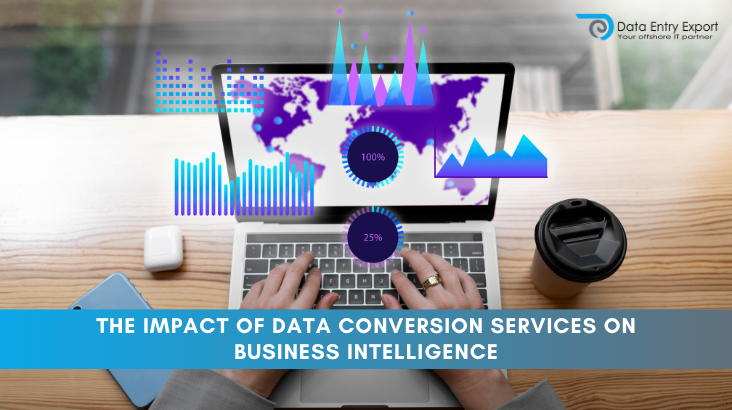As today’s era is defined by data-driven decision-making, businesses increasingly rely on Business Intelligence(BI) platforms to transform raw data into actionable insights. Data conversion services play a significant role in converting data into a single structure, ensuring high data accuracy. In fact, data conversion lays the very foundation for effective BI services. This blog explores the benefits of data conversion for business intelligence and how data conversion services impact BI across different dimensions.

Data Conversion Services: The Backbone of Business Intelligence
Data conversion services involve transforming raw data into digital formats. It is a valuable data management tool helping companies to leverage insightful data from historical data. The process aims to structure, standardize, and make data more compatible with BI tools. Common data conversion services we have today are document conversion, database conversion, and media conversion. By converting data into digital formats, companies can leverage business intelligence capabilities and unlock deeper insights.
Benefits of Data Conversion for Business Intelligence
- Reliable Data Output – BI services require clean, error-free data to generate reliable reports. Manual data conversion can result in errors and inconsistencies. However, automated data services such as data conversion reduce human errors and ensure uniformity. For instance, while converting handwritten documents manually, there will be errors due to misinterpretations. Nevertheless, this situation can be eliminated, and data analytics can be improved through automated data services.
- Enhanced Decision-Making – Legacy data stored in outdated formats can hinder the progress of data analysis. However, converting them into cloud-based or updated databases allows organizations to process information in real time. For instance, retail businesses can instantly track inventory changes by converting paper logs into digital dashboards.
- Flawless Integration with BI Tools – Most BI platforms require structured data formats. Eliminating inefficiencies, data conversion transforms raw information into easily retrievable and system-compatible data. In fact, data conversion allows businesses to automate reporting, generate predictive analytics, and visualize trends through interactive dashboards.
- Cost and Time Efficiency – Manual data processing takes time and is overpriced compared to that of automated conversion. Organizations have to take care of employee benefits and technological infrastructure. However, data conversion with modern tools reduces operational costs by automating processes. This allows companies to optimize resource allocation and employees to focus on data analysis rather than data cleaning.
- Advanced Data Protection and Compliance – Advanced data protection is one of the significant benefits of data conversion for business intelligence. Industries such as healthcare and finance require strict compliance for data management. Converting and storing paper-based documents into encrypted digital files improves security and makes audits a lot easier.
- Unified Data Architectures – Organizations commonly store data in different formats. Data conversion services transform and unify disparate data formats into an integrated structure. This way, BI services or tools no longer need to go through complex datasets in disparate formats and can analyze consistent datasets, eliminating complexity.
- Legacy Data Transformation – Modernizing archival data is one of the crucial benefits of data conversion for business intelligence. In reality, decades of archival data will be stored in outdated and underutilized systems. Data conversion allows businesses to migrate legacy datasets into contemporary business intelligence platforms. As a result, historical data becomes insights that can help enterprises to forecast and plan for the future.
Best Practices for Effective Data Conversion
To maximize the benefits of data conversion for business intelligence, businesses should follow industry best practices. The following are some of the best practices companies should consider when it comes to data conversion.
- Define Objectives – Always be clear about which data needs conversion and the output format, focusing on business requirements. Failing to do so can result in operational inefficiencies.
- Use AI and Automation Tools – Instead of manual labor, prioritize integrating AI and automation tools. Using advanced tools and technologies will ease the process of scanning and organizing unstructured data.
- Ensure Data Cleansing and Validation – Removing duplicates, correcting errors, and standardizing data formats before BI analysis will give you better results. So, invest more time in data cleansing and validation.
- Opt for Cloud-Based Solutions – Rather than storing data on local servers or computers, opt for cloud storage so that the BI team can access it seamlessly. This improves how easily data can be accessed and guarantees better scalability.
- Collaborate with Industry Experts – Collaborating with industry-leading service providers ensures data accuracy, security, and compliance in data conversion. This not only improves data quality but also facilitates data analytics.
The Bottom Line
Data conversion services are a critical business intelligence enabler, helping businesses convert raw and unstructured data into actionable insights. The benefits of data conversion services for business intelligence are many, including data accuracy, efficient data management, data security, and advanced data analytics. As AI and cloud computing evolve, the kinship between data conversion and BI services will only grow stronger, paving the way for a more data-driven future. Organizations that invest more in optimized conversion can position themselves to make faster, more accurate decisions, driving competitive advantages.
Ready to elevate your business intelligence capabilities with data services such as data conversion? Contact us at [email protected] to avail of future-ready data conversion services!
